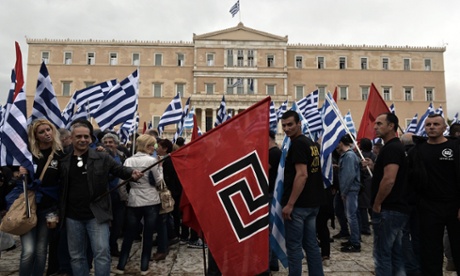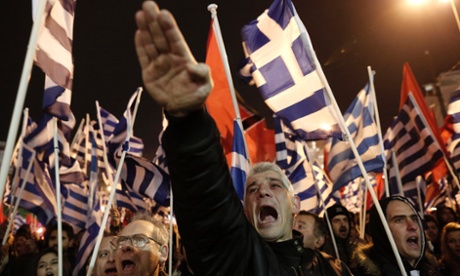11 November 2013 | By Hugo Dixon
Greece’s reform job is not even half finished. The government hasn’t done enough to root out the vested interests that strangle the economy. Nor has it cracked down fully on tax evasion or pushed hard enough to privatise state-owned properties.
On the other hand, Antonis Samaras’ coalition is so fragile that it could collapse if the Troika - the European Commission, the European Central Bank and the International Monetary Fund - forces it to impose more austerity. That could lead to a new phase in the Greek crisis. The government’s best bet is to make a sharp distinction between structural reform and austerity - and persuade its lenders that it’s so serious about the former that more cuts and taxes aren’t required.
The atmosphere in Athens, which I visited last week, is tense. One reason is that two members of the ultra-right wing Golden Dawn party had just been murdered in a professional hit job. That followed the killing of a left-wing rapper by a member of Golden Dawn which, in turn, had triggered the arrest of the party’s leader. No one is quite sure whether this is the start of a cycle of violence which could destabilise the government, drive away tourists (the country’s main source of export revenues) and undermine business confidence.
The other reason for the tension was that the troika was in town for its latest review of Greece’s mega bailout. Going into the talks, the government’s lenders were hinting that a further budget squeeze of the order of 3 billion euros (more than 1.5 per cent of GDP) was needed to hit next year’s fiscal targets. Athens’ own view was that the “fiscal gap” was only 500 million euros.
One small party pulled out of Samaras’ coalition in the summer after he sought to close the national broadcaster in a ham-fisted way. As a result, his majority is wafer thin and backbench parliamentarians from both governing parties could rebel if they are asked to approve more unpopular measures.
It’s hard to predict what would happen if the government fell. But none of the main scenarios - a weak technocratic government, new elections leading to a hung parliament or a victory for the opposition Syriza party - looks appealing.
Although Alexis Tsipras, Syriza’s leader, has been toning down his fiery left-wing anti-troika rhetoric, he would struggle to control his party if he made too many compromises with Greece’s lenders. On the other hand, if he tore up Athens’ deal with the troika, Greece could enter a new vicious spiral ending in the imposition of capital controls and the country’s exit from the euro.
All this would be a tragedy given the sacrifices the Greek people have already made and the fact that some results are starting to show. The country is on track to have a primary budget surplus - before interest payments - this year and has also almost achieved a balance in its current account.
Meanwhile, the consensus view is that the economy, which has shrunk by a quarter during the recession, will grow a tiny bit next year.
These successes have produced something close to euphoria in financial markets. The yield on 10-year government bonds has fallen to 8.2 per cent from over 30 per cent in the middle of last year. Over the same period, the Athens stock market has more than doubled. Hedge funds have piled into Greek banks. International investors are sniffing around for bargains.
The government seems torn over how best to handle its discussions with the troika. Its initial inclination seemed to be to dig its heels in, refuse to take any more measures and use the threat of a Syriza government to blackmail its lenders into taking a softer line. Given the hostility in many European countries, especially Germany, to bailing Greece out in the first place, this would not be wise.
A better option is to argue that the Greek economy does not need more austerity but accept that it is crying out for reform. Apart from combating tax evasion and accelerating privatisation, the main priority is to liberalise the vast swathes of the economy that are clogged up with restrictive practices. For example, oil refining and petrol distribution is cartelised, while professions such as notaries have rigid centrally agreed fee structures.
The Organisation for Economic Cooperation and Development has just sent Greece a comprehensive report with detailed ideas about how to improve its business environment and so create growth. Although the OECD “toolkit” has not been published, three people who’ve seen it say it could provide the basis for a substantial reform effort.
Samaras may not be an instinctive reformer. And it wouldn’t be easy for him to confront vested interests. But embracing reform is his best chance not just of hanging onto power but also of being ultimately seen as a successful prime minister. If Samaras can pull off a “reform heavy, austerity light” deal with the troika, it could lead to a virtuous cycle. More investment will flow into the country. Samaras himself will be able to use the first half of next year, when Greece holds the European Union presidency, to promote the country’s rehabilitation. That could pave the way for the EU to lighten Athens’ debt load later in the year.
But to secure all this, Samaras will have to persuade the troika that he really is genuine about reform. They have seen too many Greeks bearing gifts to be easily fooled.
Hugo Dixon: Greece's reform job isn’t even half done | Columns | Breakingviews
![The [Greek] European Tragedy](https://blogger.googleusercontent.com/img/b/R29vZ2xl/AVvXsEiWKI5s90SFm1wWTk6bs4p7CgslaC2SnYPsrZhb-B-smOufNNCSxCvpBLI9hOB-LsXZjir_PNmEiMk2-E62F3xkg96IoC6QFAaZAnPRTVH340IN9WBRmWJqPkjWlgyRj3zpALp7h6hvA58/s920/GkBack_new.jpg)





